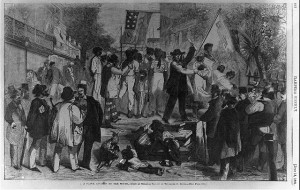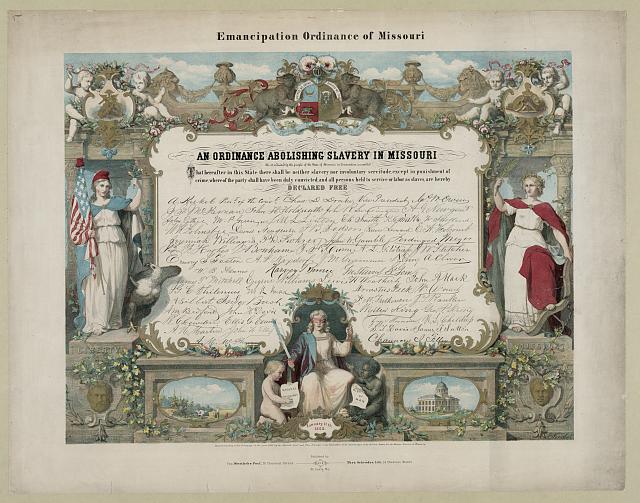On July 1, 1863 the Missouri State Convention passed a plan for gradual emancipation beginning in 1870. The following editorial knows why the decision was made – you can’t pretend to be loyal to the Union while still supporting slavery.
From The New-York Times July 3, 1863:
Emancipation in Missouri–The Beginning of a New Epoch.
July first, eighteen hundred sixty-three, is a date destined to be forever memorable in American history. It will figure as the starting point of State emancipation. The Constitutional Convention of Missouri on that day adopted an ordinance providing for the complete extinction of Slavery in that State. No act of the kind has been done since the formation of the Federal Constitution, save in a single instance; and that was on so small a scale that it scarcely deserves mention in this connection. We refer to the act provisionally abolishing Slavery in this State of New-York in 1799. …
The entire slave population in Missouri, by the census of 18[60], was 114,931. This was an increase of 27,500 from the census ten years previous. The fact that such an increase should have taken place, in the face of the protracted Kansas struggle, evinces the exceeding vigor of the institution in the State. It would be hard to specify any State in the Union — South Carolina always excepted — which ten years ago was ruled by an intenser Pro-Slavery spirit than Missouri. This spirit, in the treatment of Kansas, showed itself to be hardly less than an absolute frenzy. It will be ten years this Fall since the conspiracy for breaking down the Missouri Compromise and making Kansas a Slave Stale, was formed. The leaders in that conspiracy would as soon have believed that the “crack of doom” would come within the next decade as an emancipation ordinance within the State of Missouri. The past history of the country would be searched in vain for another instance of such an extreme revolution of feeling, on a vital matter, within so brief a period.
What makes it the more notable is that it has been effected without any very serious controversy. The change has been brought about entirely by the silent logic of events The Convention which passed the ordinance was [???] [called?] two years ago without the slightest reference to the question of emancipation. Nobody at that time dreamed that the abolition of Slavery would ever be a question before it. Its province was intended to be confined to the reorganization of the State Government, which the treason of the Governor and the other principal State official had made necessary. The Convention was made up almost entirely of cautious, conservative men, and it was not until the popular mind had recognized the new necessities of the time, and forced the Convention to act upon the subject, that the body ventured to take it in hand. Emancipation was already a “foregone conclusion,” when the subject first presented itself. The only debatable question was the method. The people here were far more Impatient than the members of the Convention felt at liberty to sanction. Probably a majority of the people were in favor of the proposition to make the work of emancipation immediate — a policy which, a few years ago, was deemed by all, save the extremest Abolitionists of the Garrisonian stamp, to be downright madness. Though the majority of the Convention could not bring themselves up to this mark, they yet decided that Slavery should absolutely cease in seven years — which most Anti-Slavery men would have once pronounced an absurdly brief period for bringing about so great a change. New-York, with less than one-fifth of the number of slaves held in Missouri, did not think it safe and wise to allow less than twenty-eight years for the gradual destruction of the system within her limits. Yet the only doubt about this Missouri ordinance is that it will not satisfy the people, because Slavery was given seven years to die in. There will probably be a movement by the next State Legislature to call another Convention for the express object of making the emancipation immediate; and it would not be at all strange if such an effort were successful.
The cause of this prodigious social revolution in Missouri is no mystery. Everybody understands that it came from the universal conviction that Slavery in the State was an inseparable ally of the Confederacy; and that there was no way to secure and consolidate the loyalty of the State but to give a death-blow to this domestic enemy. The people realized that there had got to be a final choice between Slavery and their national allegiance. They were brought to it by events which they did not foresee, a[nd] could not control; but like true men, they accepted the situation, and promptly shaped their action accordingly. By sacrificing Slavery, they have saved their State, and to-day Missouri is just as impracticable for the purposes of the Confederates as Iowa or Illinois.
The same inevitable course of events will, sooner or later, compel the extinction of Slavery in Maryland and Kentucky. The folly of striving to be loyal, and yet fostering an institution which is essentially and intensely disloyal, will become more and more manifest, until finally the purpose will be formed to submit to it no longer. Even without the President’s Proclamation, we believe that emancipation would be inevitable in the Confederate States before they could again be rehabilitated as loyal members of the Union. Almost all of the really loyal men of the South agree that to perpetuate the institution is to perpetuate hostility to the Government: They maintain with reason that if loyalty is to be resuscitated, that which destroyed loyalty must be itself destroyed. No future fact is more certain than that if the Confederacy dies, Slavery too must quickly follow. The blow it has just received in Missouri is but the beginning of the end.
The Times was right in its prediction that there would eventually be an ordnance for immediate emancipation in Missouri, as can be seen from this image commemorating January 11, 1865:



